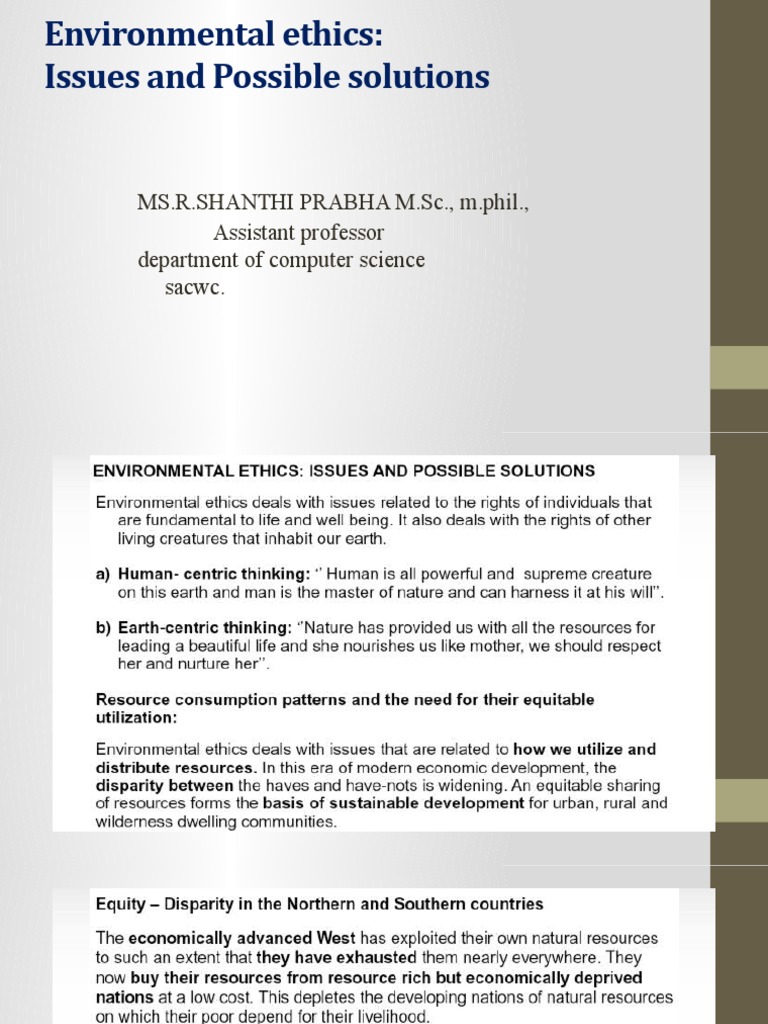The discourse surrounding environmental ethics has burgeoned into a multifaceted arena of inquiry, akin to an intricate tapestry woven with strands of philosophy, ecology, and social justice. Emerging from the depths of burgeoning ecological crises, these ethical considerations prompt society to reexamine its intrinsic relationship with the natural world. Below, we explore several salient issues currently shaping the landscape of environmental ethics, shedding light on the complexities that characterize this field.
1. Anthropocentrism versus Ecocentrism
At the core of environmental ethics lies the perennial debate between anthropocentrism and ecocentrism. Anthropocentrism posits human beings at the apex of moral consideration, treating nature primarily as a resource for human benefit. In stark contrast, ecocentrism advocates for an intrinsic value of all living and non-living entities, thereby extending ethical considerations beyond humanity. This ideological rift engenders contentious discussions regarding conservation efforts, resource allocation, and moral obligations towards non-human life forms. The metaphor of a Mariner and a vast, unchartered sea perfectly encapsulates this dichotomy; one must decide whether to chart a course for individual gain or navigate the intricate currents that sustain the entire maritime ecosystem.
2. Climate Justice and Inequality
The specter of climate change looms perilously over contemporary society, intertwining environmental degradation with issues of social justice. A significant ethical dilemma arises from the disproportionate impacts of climate change on marginalized communities, which often bear the brunt of environmental destruction despite contributing the least to global greenhouse gas emissions. The principle of climate justice thus emerges, demanding recognition of the ethical obligation to address these disparities and to empower affected communities. In this context, one can liken society to a vast orchestra: when some instruments are silenced or tuned poorly, the harmony of the entire composition suffers. Ethical considerations in environmental policy must therefore strive for equitable participation and representation.
3. Biodiversity and Extinction
The sixth mass extinction is unfolding before our eyes, driven by human activity that disturbs natural habitats and decimates biodiversity. Ethical discussions surrounding the preservation of species and ecosystems evoke profound questions about our responsibilities towards non-human life. Should society prioritize the conservation of charismatic megafauna over less appealing organisms? The intricate web of life suggests that the extinction of a single species can reverberate through the ecosystem, much like a stone cast into a pond creates ripples that spread far and wide. Thus, the ethical imperative to safeguard biodiversity becomes an urgent call to action, emphasizing that every species plays a role in the symphony of life.
4. The Concept of Intergenerational Justice
Intergenerational justice posits a moral framework that transcends temporal boundaries, urging the present generation to consider the rights of future inhabitants of Earth. This ethical dilemma raises poignant inquiries about resource consumption, waste generation, and environmental stewardship. The metaphorical stewardship of one’s resources, akin to a family heirloom passed down through generations, is a compelling analogy. Just as one would care for an heirloom to ensure its preservation, so too must society actively engage in sustainable practices that honor the rights of future generations. This entails not merely a moral responsibility but a profound obligation to diminish ecological footprints and foster adaptive strategies that prioritize the long-term health of the planet.
5. Technological Solutions and Ethical Implications
As society grapples with environmental dilemmas, the allure of technological solutions beckons. Renewable energy technologies, genetic engineering, and geoengineering present intriguing possibilities for sustainable innovation. However, the ethical ramifications of these technologies warrant careful scrutiny. The unbridled enthusiasm for technological “quick fixes” often glosses over potential adverse consequences, such as environmental inequities, unforeseen ecological disruptions, and the moral implications of manipulating nature. Here, the metaphor of a double-edged sword is particularly apt; the same technology that can illuminate a darkened room may also cause irreversible harm if wielded irresponsibly. This highlights the necessity for robust ethical frameworks to guide the development and deployment of technological advancements in environmental contexts.
6. Indigenous Knowledge and Rights
Indigenous communities offer rich reservoirs of ecological knowledge and sustainable practices, developed over millennia of cohabitation with the land. The incorporation of indigenous perspectives into environmental ethics acknowledges a narrative often marginalized in mainstream discourse. In honoring these voices, one must consider the ethical implications of colonial history, land dispossession, and cultural appropriation. The metaphor of a tapestry woven from diverse threads illustrates the importance of inclusivity; different patterns and colors contribute to a more profound, holistic understanding of environmental ethics. Hence, elevating indigenous rights and knowledge becomes not only an ethical imperative but a pathway to holistic ecological solutions.
7. The Role of Education and Advocacy
Finally, the role of education and advocacy cannot be overemphasized in the realm of environmental ethics. Disseminating knowledge and fostering critical discourse equips individuals to engage meaningfully with pressing ecological issues. Educational institutions have the potential to serve as crucibles for ethical contemplation, igniting awareness and inspiring action among future leaders. The metaphor of a garden inherently conveys this notion; nurturing seeds of awareness yields a flourishing community of advocates equipped to confront environmental injustices. Through educational initiatives and grassroots advocacy, society can cultivate an ethos of responsibility and care for the planet.
In conclusion, the current issues in environmental ethics reflect a complex interplay of philosophical, ecological, and social dimensions, each inviting deep contemplation and robust dialogue. As humanity navigates these challenges, it must adopt a holistic, integrative approach to ensure a sustainable and just future for all inhabitants of Earth. The fabric of environmental ethics is woven from the threads of our collective responsibility, urging us to engage with the natural world thoughtfully and with respect.










